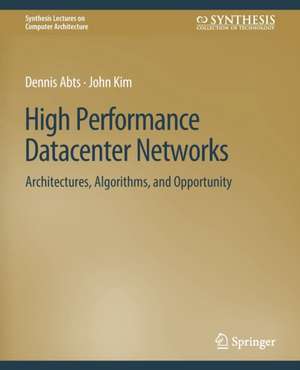High Performance Datacenter Networks: Architectures, Algorithms, and Opportunities: Synthesis Lectures on Computer Architecture
Autor Dennis Abts, John Kimen Limba Engleză Paperback – 10 mar 2011
Din seria Synthesis Lectures on Computer Architecture
-
 Preț: 359.05 lei
Preț: 359.05 lei - 18%
 Preț: 690.22 lei
Preț: 690.22 lei - 20%
 Preț: 281.76 lei
Preț: 281.76 lei -
 Preț: 453.85 lei
Preț: 453.85 lei -
 Preț: 226.98 lei
Preț: 226.98 lei -
 Preț: 388.52 lei
Preț: 388.52 lei -
 Preț: 353.79 lei
Preț: 353.79 lei -
 Preț: 481.05 lei
Preț: 481.05 lei -
 Preț: 261.32 lei
Preț: 261.32 lei -
 Preț: 413.27 lei
Preț: 413.27 lei -
 Preț: 494.18 lei
Preț: 494.18 lei -
 Preț: 260.56 lei
Preț: 260.56 lei -
 Preț: 450.11 lei
Preț: 450.11 lei -
 Preț: 319.21 lei
Preț: 319.21 lei -
 Preț: 449.53 lei
Preț: 449.53 lei -
 Preț: 264.41 lei
Preț: 264.41 lei -
 Preț: 418.07 lei
Preț: 418.07 lei -
 Preț: 386.22 lei
Preț: 386.22 lei -
 Preț: 486.98 lei
Preț: 486.98 lei -
 Preț: 264.20 lei
Preț: 264.20 lei -
 Preț: 383.71 lei
Preț: 383.71 lei -
 Preț: 346.86 lei
Preț: 346.86 lei -
 Preț: 265.18 lei
Preț: 265.18 lei -
 Preț: 323.45 lei
Preț: 323.45 lei -
 Preț: 260.18 lei
Preț: 260.18 lei -
 Preț: 191.48 lei
Preț: 191.48 lei -
 Preț: 206.29 lei
Preț: 206.29 lei -
 Preț: 205.92 lei
Preț: 205.92 lei -
 Preț: 205.70 lei
Preț: 205.70 lei -
 Preț: 207.06 lei
Preț: 207.06 lei -
 Preț: 260.95 lei
Preț: 260.95 lei -
 Preț: 261.91 lei
Preț: 261.91 lei -
 Preț: 192.63 lei
Preț: 192.63 lei -
 Preț: 262.09 lei
Preț: 262.09 lei -
 Preț: 259.41 lei
Preț: 259.41 lei -
 Preț: 260.95 lei
Preț: 260.95 lei -
 Preț: 456.66 lei
Preț: 456.66 lei -
 Preț: 261.53 lei
Preț: 261.53 lei -
 Preț: 486.42 lei
Preț: 486.42 lei -
 Preț: 210.55 lei
Preț: 210.55 lei -
 Preț: 387.58 lei
Preț: 387.58 lei -
 Preț: 448.38 lei
Preț: 448.38 lei -
 Preț: 264.20 lei
Preț: 264.20 lei -
 Preț: 262.68 lei
Preț: 262.68 lei -
 Preț: 263.06 lei
Preț: 263.06 lei - 20%
 Preț: 288.91 lei
Preț: 288.91 lei -
 Preț: 260.95 lei
Preț: 260.95 lei -
 Preț: 313.82 lei
Preț: 313.82 lei
Preț: 194.92 lei
Nou
Puncte Express: 292
Preț estimativ în valută:
37.30€ • 38.94$ • 30.87£
37.30€ • 38.94$ • 30.87£
Carte tipărită la comandă
Livrare economică 04-18 aprilie
Preluare comenzi: 021 569.72.76
Specificații
ISBN-13: 9783031006029
ISBN-10: 303100602X
Ilustrații: XVI, 99 p.
Dimensiuni: 191 x 235 mm
Greutate: 0.21 kg
Editura: Springer International Publishing
Colecția Springer
Seria Synthesis Lectures on Computer Architecture
Locul publicării:Cham, Switzerland
ISBN-10: 303100602X
Ilustrații: XVI, 99 p.
Dimensiuni: 191 x 235 mm
Greutate: 0.21 kg
Editura: Springer International Publishing
Colecția Springer
Seria Synthesis Lectures on Computer Architecture
Locul publicării:Cham, Switzerland
Cuprins
Introduction.- Background.- Topology Basics.- High-Radix Topologies.- Routing.- Scalable Switch Microarchitecture.- System Packaging.- Case Studies.- Closing Remarks.
Notă biografică
Dennis Abts is a Member of Technical Staff at Google, where he is involved in the system architecture and design of next-generation large-scale clusters. His research interests include scalable interconnection networks, parallel computer system design, and fault tolerant computing. Prior to joining Google, Dennis was a Sr. Principal Engineer and System Architect for Cray Inc. where he was principally involved with the architecture and design of several large-scale parallel computers over the span of his 10+ year tenure at Cray. Including, the Cray XT3 (Red Storm) and XT4, Cray X1, Cray BlackWidow (XT5), and next-generation systems sponsored by the DARPA HPCS initiative. Abts received his Ph.D. in computer science from University of Minnesota. Dennis Abts is a Member of Technical Staff at Google, where he is involved in the system architecture and design of next-generation large-scale clusters. His research interests include scalable interconnection networks, parallel computer system design, and fault tolerant computing. Prior to joining Google, Dennis was a Sr. Principal Engineer and System Architect for Cray Inc. where he was principally involved with the architecture and design of several large-scale parallel computers over the span of his 10+ year tenure at Cray. Including, the Cray XT3 (Red Storm) and XT4, Cray X1, Cray BlackWidow (XT5), and next-generation systems sponsored by the DARPA HPCS initiative. Abts received his Ph.D. in computer science from University of Minnesota.
